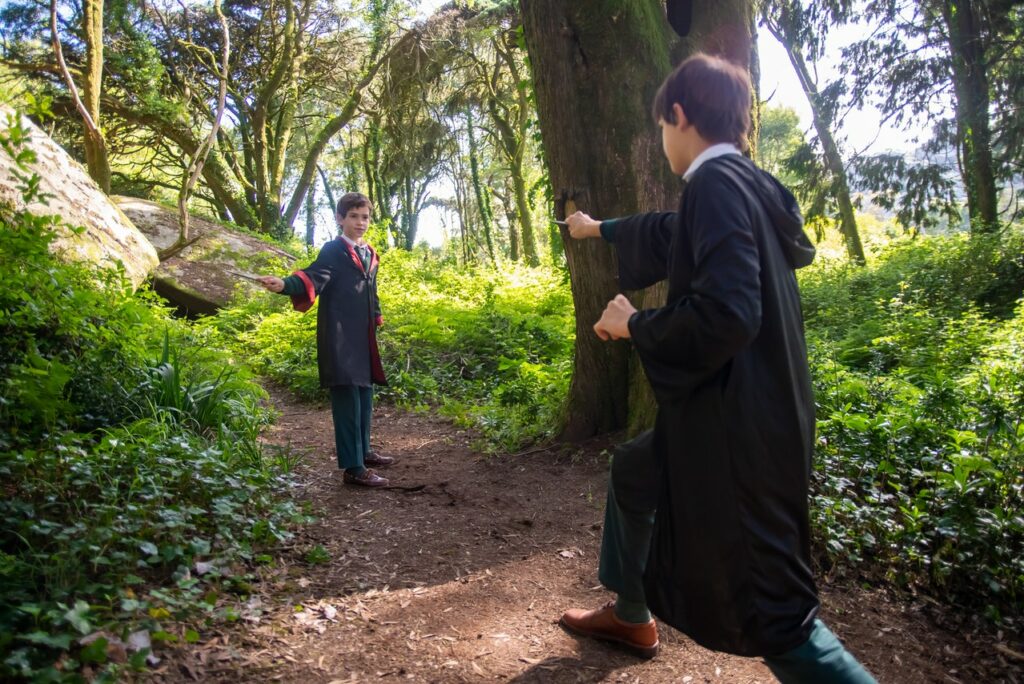The Importance of Role Play In Child Development

The importance of role-playing in a child’s development involves enhancing skills required for healthy growth. Role play is an important part of child development.
It helps children learn about the world’s phenomena and human behavior in their early years and prepares them for future interactions.
There are different types of role play, and each one offers its own benefits.
It is no coincidence that child therapists use role-play to diagnose a child, understand his difficulties in-depth and help them develop better through role-playing games.
Here, we will discuss the importance of role-playing in child development and explore some of the main types that are available.
Table of Contents
What Is The Importance Of Role Play In Child Development?
Role play is the act of pretending to be someone or something else. It can involve dressing up in costumes, using props, and acting out scenes.
Role play helps children learn about the world around them. They can explore different roles, experience different situations, and develop different points of view.
This helps them build empathy and compassion and strengthens them for future interactions. Role-play also offers a variety of benefits for child development. It can help young children develop communication skills, problem-solving skills, social skills, etc.
Each type of role-playing offers its own unique benefits. The main key is to find the right type of children’s play for their specific needs.
“Play is the highest form of research.”
Albert Einstein
Ideas For Different Types Of Role Play Scenarios
There are many different types of role play available today. The most common types include:
- Pretend play
- Dramatic play
- Social play
- Fantasy play
Each type of role-play has its own benefits for child development. Let’s explore each one in more detail.
Pretend Play
Pretend play, also called imaginative play, is the most common type of role play. It involves children pretending to be someone or something else. They might pretend to be a doctor, a chef, or a superhero.
It can be even while enhancing their gross motor skills. They can interact in physical play and pretend to be superheroes running and jumping.
Pretend play helps children learn about the environment and different reactions around them. They can explore different roles and experience different situations.
Pretend play also offers a variety of benefits for child development. It can help children develop communication skills, cognitive skills, problem-solving skills, social skills, etc.
Dramatic Play
Dramatic play is a type of role play that involves acting out real-life situations or made-up stories. Dramatic play can take many different forms.
It can be as simple as two children pretending to be mom and dad, or it can be a more elaborate production with costumes and props and pretend toys such as ‘pretend food,’ ‘doctor kits,’ and such to create their scenes.
Dramatic play helps children develop important life skills. It also helps to develop children’s imaginations and creativity.
You can also encourage your child to engage in dramatic play by modeling pretend play yourself. For example, you can pretend to cook a meal together or be an animal.
Social Play
Social play is a type of role play that involves interacting with others. Children might play games like tag or house.
Benefits of social play include:
- Helping children learn to share and take turns
- Giving children a chance to practice their communication skills
- Assisting children to learn about social cues and develop social skills
- Allowing children to express themselves and their emotions
- Teaching children how to resolve conflicts
- Assisting children to build self-confidence
Fantasy Play
Fantasy play is a type of role play that involves using imagination to create stories and characters. Children, using this type of free play, might pretend to be dragons, fairies, or superheroes.
Fantasy play helps children in their cognitive development by practicing cognitive flexibility while trying to cope with difficult situations. It also plays an important role in learning about different cultures and worlds to make sense of the world.
Fantasy play is a great way for kids to use their imaginations while playing for fun. It can also help them develop essential qualities and skills that will benefit them throughout their lives.
Fantasy play can help children to understand and cope with difficult emotions. For example, if a child feels scared or sad, they may pretend to be a brave superhero who defeats the bad guys.
Fantasy play can also help children develop their language skills and learn new vocabulary as they often need to describe their make-believe worlds to others.

Reasons Why It Is Important For Your Child
Role-playing is a great way for children to learn about their world. It helps them to understand different scenarios and how to react in various situations.
Through role-playing, children can develop their creativity and imagination. They can also learn new words and enhance their communication skills.
Additionally, role-playing can help promote social and emotional development in children.
Lastly, it can help with impulse control and emotional regulation.
These are important aspects of child development that should not be overlooked. If you want your child to out-perform in all areas, make sure to include plenty of role-playing in their lives!
Develop Social And Emotional Skills
One of the most important benefits of role-playing is that it helps children increase social development and emotional skills. Role-playing allows children to act out different social scenarios. This helps them learn how to interact with others in a safe and controlled environment.
They can experiment with different social cues and responses in a social interaction they can not experience in daily life.
Role-playing also allows children to explore their emotions. Children can act out scenes that make them feel happy, sad, scared, or angry. This provides them a way of understanding these emotions better. It also allows them to express these emotions healthily.
Both social and emotional skills are an essential part of a child’s development.
The sooner your child starts developing these skills, the better off they will be later in life. Role-playing is no doubt one of the best ways to help your child develop these skills.
A Study conducted by Lise M. Youngblade and Judy Dunn indicates the importance of healthy relationships between a child and his family members:
“Results revealed individual differences in the amount and sophistication of young children’s social pretend play and suggested that these individual differences are related to experiences in the relationships that young children have with their mothers and siblings.
Results also indicated that early social pretend play was significantly related to the child’s developing understanding of other people’s feelings and beliefs. The data are interpreted as providing support for the notion that early experience in social pretense is associated with children’s mastery of the relation between mental life and real life.”
M. Youngblade and Judy Dunn
Develop Communication Skills
Role-playing also helps children develop communication skills. Children need to be able to interact easily and effectively with others in order to have successful social interactions.
Through role-playing, children learn how to express themselves clearly and effectively. They learn how to listen to others and respond in a way that is appropriate.
Role-playing can also help children accelerate their language development and increase their communication skills. Children learn new words and phrases through role-playing. They also learn how to use these words and phrases correctly in a sentence.
Language and communication skills are essential for success in school and in life. The earlier your child starts developing these skills, the better off they will be later in life.
Control Impulses And Regulate Emotions
Role-playing can also promote impulse control and emotion regulation. Children learn how to hold their automated reactions, think before they act, and find a way to control their emotions and reactions.
By role-playing with others, they express suppressed inner unsolved conflicts. It helps them cope with the negative emotional challenges and become resilient and stronger in real life.
Problem-Solving Skills
Role-playing can also help children develop problem-solving skills. Children can often solve a problem by using their imagination and practicing mind flexibility when faced with a problem. They might come up with creative solutions that they would never think of in real life.
Encourages Creativity And Imagination
Role-playing also encourages creativity and imagination. Children can explore different worlds and characters through fantasy play. They can also create their own stories and scenarios through dramatic play and develop their creative thinking skills.
Conclusion
The importance of role-playing in child development is undeniable. Through role-play, children can learn about themselves and the world around them. They can experiment with different roles, explore new ideas, and practice social skills.
Role play helps children develop creativity and imagination, enriches language and communication skills, and promotes impulse control and regulation of emotion. The benefits of role-playing are vast, and it is a valuable tool for parents and educators alike.
Read also:
- What Are Educational Toys? Essential For Child’s Development!
- Best Toys to help Toddlers Talk – Speech Development
- Your Toddler Throws Toys Instead of Playing? Here’s Why
- Best Wooden Play Dough Tools – Playdough Toys
- Best Wooden Balance Board for Toddlers and Kids
- Bumbo Floor Seat vs. Fisher-Price Sit-Me-Up – Which one is the Best for your baby?
